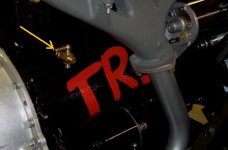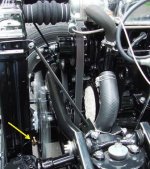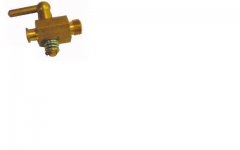angelfj1
Yoda
Offline
This is an excerpt from my post on the UK TR register forum.
<span style="font-style: italic">George: Yes, it could be that simple. However, here is something else to consider. From your photos, it appears that your car was restored recently. I will assume that the parts came from one of the three major suppliers here. We discovered while testing my 3A for coolant leaks that both the engine block and radiator drain cocks leaked. The leak was not at the threads where they thread into their bungs. They actually leak right past the seats, enough to make a large puddle overnight. We ordered three new drain cocks, one from each of the major suppliers. They were all identical and they all leak. In order to maintain genuine appearance we soldered a plug in both drain cocks and replaced them. When we need to drain the system we will merely remove the useless drain cocks and empty the system for flushing , etc.
Sorry to go on ad nausiam, but perhaps you are losing coolant in this way.</span>
<span style="font-style: italic">George: Yes, it could be that simple. However, here is something else to consider. From your photos, it appears that your car was restored recently. I will assume that the parts came from one of the three major suppliers here. We discovered while testing my 3A for coolant leaks that both the engine block and radiator drain cocks leaked. The leak was not at the threads where they thread into their bungs. They actually leak right past the seats, enough to make a large puddle overnight. We ordered three new drain cocks, one from each of the major suppliers. They were all identical and they all leak. In order to maintain genuine appearance we soldered a plug in both drain cocks and replaced them. When we need to drain the system we will merely remove the useless drain cocks and empty the system for flushing , etc.
Sorry to go on ad nausiam, but perhaps you are losing coolant in this way.</span>

 Hi Guest!
Hi Guest!

 smilie in place of the real @
smilie in place of the real @
 Pretty Please - add it to our Events forum(s) and add to the calendar! >>
Pretty Please - add it to our Events forum(s) and add to the calendar! >> 


 Either I have lost touch with reality since my recent retirement or you folks enjoy being ripped off!
Either I have lost touch with reality since my recent retirement or you folks enjoy being ripped off!




